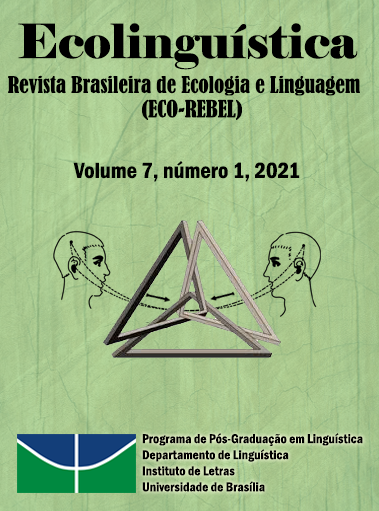Uma Leitura ecossistêmica do conto Maria, da autora Conceição Evaristo
Abstract
This article analyzes the short story Maria, by Conceição Evaristo, under the praxis of the Ecosystem Discourse Analysis, to observe how the racial prejudice discourse impels subjects to practice violence against the black population, in addition to determining how the Afro-Brazilian population I interacted socially. This story tells the story of the character Maria, a black woman, who lives in a slum, works as a domestic worker in the home of a high-income family. On the way home, after another day of work, he gets on a bus that is assaulted by his ex-partner, father of his first child and his great love, and dies, victim of lynching, as a result of a mistake. We used as a basis the theoretical current Analysis of the Ecosystem Discourse, postulated by Couto (2014), which embraces the concepts of valuing life and the fight against avoidable suffering, defending the ideology of life. Thus, it was noticed that this narrative highlights discrimination and prejudice against black people and disadvantaged economic class, in addition to focusing, through disharmonious interactions, the contempt and exclusion suffered by black people and women.
Downloads
References
BERND, Zilá. Introdução à literatura negra. São Paulo: Editora Brasiliense, 1988.
CAPRA, F. O tao da física. São Paulo: Editora Cutrix, 2002.
COUTO, Hildo H do. Ecolingüística: estudo das relações entre língua e meio ambiente. Brasília: Thesaurus Editora, 2007.
______ (Org.). O paradigma ecológico para as ciências da linguagem: ensaios ecolinguísticos clássicos e contemporâneos. Goiânia: Editora UFG, 2016.
______. Linguística Ecossistêmica. Ecolinguística: Revista Brasileira de Ecologia e Linguagem, v. 1, n. 1, p. 39-62, 2015. Disponível em: <http://webcache.googleusercontent.com/search?q=cache:http://periodicos.unb.br/index.php/erbel/article/view/15135/10836&gws_rd=cr&ei=g-rFVffwNsX8wQSk4LLgCw>. Acesso em: 11 jan. 2017
________. Linguística Ecossistêmica Crítica ou Análise do Discurso Ecológica. In: COUTO, E. (Org.). Antropologia do Imaginário, Ecolinguística e Metáfora. Brasília: Thesaurus, 2014.
________. Ecossistema cultural. Ecolinguística: Revista Brasileira de Ecologia e Linguagem, v. 4, n. 1, p. 44-58, 2018. Disponível: . Acesso em: 14 maio 2019.
COUTO, H. H. do; COUTO, E. K. N. N. do; BORGES, L. A. de O. Análise do Discurso ecológica ”“ (ADE). Campinas: Pontes Editores, 2015. (Coleção Linguagem e Sociedade, v. 9). DOURADO, Zilda. As inter-relações entre língua, corpo e cultura na roda de capoeira sob o viés da Ecolinguística. 2017. 138 p. Tese (Doutorado em Linguística) ”“ Faculdade de Letras, Universidade Federal de Goiás, Goiânia, 2017.
DUARTE, Eduardo de Assis. Literatura e afrodescendência no Brasil: antologia crítica. Belo Horizonte: UFGM, 2011.
EVARISTO, Conceição. Maria. Olhos d´água. Rio de Janeiro: Pallas, 2016.
______. Literatura negra: uma poética de nossa afro-brasilidade. Scripta, Belo Horizonte, v. 13, n.25, p. 17-31, 2º sem. 2009. Disponível em:<http://periodicos.pucminas.br/index.php/scripta/article/view/4365/4510> Acesso em: 22 jul. 2019.
GOMES, Nilma Lino. Alguns termos e conceitos presentes no debate sobre relações raciais no Brasil: uma breve discussão. BRASIL. Ministério da Educação (Org.). Educação anti-racista: caminhos abertos pela lei Federal nº 10.639/03. Brasília: SECAD, 2005 Disponível em: . Acesso em: 22 de jul. 2019.
MACEDO, Tania. O ensino das literaturas africanas de língua portuguesa no Brasil: algumas questões. In: SECCO, Carmen T.; SALGADO, Maria T.; JORGE, Silvio R. África, escritas literárias: Angola, Cabo Verde, Guiné-Bissau, Moçambique, São Tomé e Príncipe. Rio de Janeiro: Editora UFRJ : Angola: UEA, 2010. p.277-84.
MACHADO e SILVA, Lais Carolina. O discurso político de Marina Silva sob a perspectiva da análise do discurso ecológica. Goiás, 2016. MARINGOLO, Cátia Cristina Bocaiuva. Ponciá Vincêncio e Becos da Memória de Conceição Evaristo: Construindo histórias por meio de retalhos de memórias. 2014. 132 p. Dissertação (Mestrado em Literatura) ”“ Faculdade de Ciências e Letras Campus Araraquara, Universidade Estadual Paulista, Araraquara, 2014.
PINSKY, Jaime. A escravidão no Brasil. São Paulo: Contexto, 2010.
PROENÇA FILHO, Domício. A trajetória do negro na literatura brasileira. Estudos Avançados, v. 18, n. 50, p. 161-93, 2004. Disponível em: <http://www.scielo.br/scielo.php?script=sci_arttext&pid=S0103-40142004000100017>. Acesso em: 28 maio 2020.
RITT, Caroline Fockink; CAGLIARI, Cláudia Taís Siqueira; COSTA, Marli Marlene da. Violência cometida contra a mulher compreendida como violência de gênero. Universidade Federal do Rio Grande do Sul, s.d. Disponível em: <http://www.ufrgs.br/nucleomulher/arquivos/artigo_violencide%20genero>. Acesso em:22 jul. 2019.
SILVA, Marcio M. G. Coronavírus, ideologias e Análise do Discurso Ecossistêmica. Ecolinguística: Revista Brasileira de Ecologia e Linguagem, v. 06, n. 02, p. 90-106, 2020. Disponível em: https://periodicos.unb.br/index.php/erbel/article/view/32667/26622. Acesso em: 07 nov. 2020.
Downloads
Published
How to Cite
Issue
Section
License
Copyright (c) 2021 Ecolinguística: Revista brasileira de ecologia e linguagem (ECO-REBEL)

This work is licensed under a Creative Commons Attribution-NonCommercial-NoDerivatives 4.0 International License.
Authors who publish in this journal agree to the following terms:
Authors retain copyright and grant the journal the right of first publication. The work is simultaneously licensed under the Creative Commons Attribution License allowing the sharing of the work with acknowledgment of the authorship of the work and initial publication in this journal.
Authors are authorized to enter into additional contracts separately for non-exclusive distribution of the version of the work published in this journal (e.g., publishing in institutional repositories or as book chapters), with acknowledgment of authorship and initial publication in this journal.
Authors are allowed and encouraged to post and distribute their work online (e.g., in institutional repositories or on their personal page) at any point before or during the editorial process, as this can bring about productive revisions as well as increase impact.
Citation of published works (See The Effect of Free Access).



3.png)



